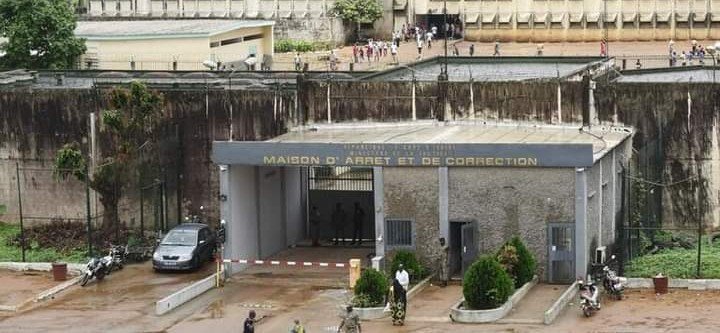A correctional centre in Cote D’Ivoire
Source: Africa Publicity
Experts of the UN Committee against Torture have questioned Ivorian authorities about the admissibility of evidence obtained through Torture and prison overcrowding across Cote D’Ivoire.
The Committee expressed grave concerns about what it referred to as “extreme prison overpopulation” and poor conditions of detainees in many Prisons across Cote D’Ivoire.
The Committee against Torture recently concluded its consideration of the initial report of Côte d’Ivoire, with Committee Experts commending the State on the creation of an inter-ministerial committee to coordinate with treaty bodies, while asking questions about the admissibility of evidence obtained through torture and overcrowding in prisons.
Abderrazak Rouwane, Committee Expert and Country Rapporteur, congratulated Côte d’Ivoire on the initiative of the inter-ministerial committee.
The Human Rights Council had adopted a resolution which encouraged States to create mechanisms to facilitate coordination for all the treaty bodies and ensure proper monitoring and follow-up. This position ensured that the State could be properly informed regarding all issues of human rights.
Mr. Rouwane asked if it was up to judges to assess if a statement obtained by torture might be admissible in proceedings, as there was still no provision in Ivorian law that provided for admissibility in any proceedings? The Committee had been made aware that confessions obtained under torture had been used to press charges against six people, who were allegedly forced to sign a document without reading it.
Todd Buchwald, Committee Expert and Country Rapporteur, said there were widespread reports of severe overcrowding in prisons which resulted in unsanitary conditions, as well as a lack of health care and staff. Could more information be provided on the provisions taken to reduce overcrowding in prisons? According to the report, up to 2019, there were 26,089 detainees in a system with a capacity of 9,139, nearly three times more than capacity. Could statistics be provided from 2019 to 2024 on the numbers of detainees in prison?
The delegation said it was up to the judge to determine whether statements obtained in a case as a result of torture were admissible or not. If it were not up to a judge to ascertain whether statements were obtained by torture, then who could? Testimonies were contained in the records, and it could be seen straight away if they were obtained under torture. A judge could dismiss police records if they established that the testimonies were obtained under torture.
Responding to further questions, the delegation said the total number of detainees was more than 27,000 whereas the State only had capacity for around 10,000. The occupation rate was more than 200 per cent above where it should be. Côte d’Ivoire was taking robust measures to rectify this situation as soon as possible. This situation was alarming, but it was important to look at measures to tackle this by the Government, which included building new prisons and a new women’s prison. The State hoped to bring down the very high occupation rate.
Alternatives to detention were effectively implemented, the delegation continued. Around 1,356 decisions had been taken for suspended sentences and more than 3,000 individuals had benefitted from probation. Presidential pardons allowed for the release of more than 11,000 detainees between 2000 and 2023.
Introducing the report, Zirignon Constant Delbe, Director of Human Rights at the Ministry of Justice and Human Rights of Côte d’Ivoire, said Côte d’Ivoire had been a party to the Convention since December 1995 and despite a long delay in the submission of its initial report, the State was ready to lay the foundations for more sustained cooperation with the treaty bodies through regular report submissions.
The State’s Penal Code had been amended to provide torture with a criminal penalty of 10 to 20 years’ imprisonment and a fine of 500,000 to 5,000,000 CFA francs. The penalty was life imprisonment when the perpetrator of the crime was a public official. The Ivorian legal system had also been enriched with new legal instruments, including the Second Optional Protocol to the Covenant on the abolition of the death penalty, ratified on 3 May 2024; the Convention for the Protection of All Persons from Enforced Disappearance, ratified on 6 June 2024; and several other laws.
In closing remarks, Claude Heller, Committee Chair, thanked the delegation for the frank and open dialogue. The Committee was aware of the efforts the State was making in their legislation and the challenges the State faced in the area of human rights. Mr. Heller hoped this was the first step in a long journey of cooperation with Côte d’Ivoire and the Committee.
Lambert Allou Yao, Ambassador and Deputy Permanent Representative of Côte d’Ivoire to the United Nations Office at Geneva and head of the delegation, in concluding remarks, thanked the Committee for the opportunity for Côte d’Ivoire to submit its initial report. The two days had allowed for a meaningful exchange and enabled the State to share its experience and benefit from the Committee’s experience.
The delegation of Côte d’Ivoire consisted of representatives from theMinistry of Justice and Human Rights and the Permanent Mission of Côte d’Ivoire to the United Nations Office at Geneva.
The Committee will issue concluding observations on the report of Côte d’Ivoire at the end of its eightieth session on 26 July. Those, and other documents relating to the Committee’s work, including reports submitted by States parties, will be available on the session’s webpage.
Summaries of the public meetings of the Committee can be found here, and webcasts of the public meetings can be found here.
The Committee will next meet in public on Thursday, 18 July at 10 a.m. to conclude its review of the fifth periodic report of Türkiye (CAT/C/TUR/5).








